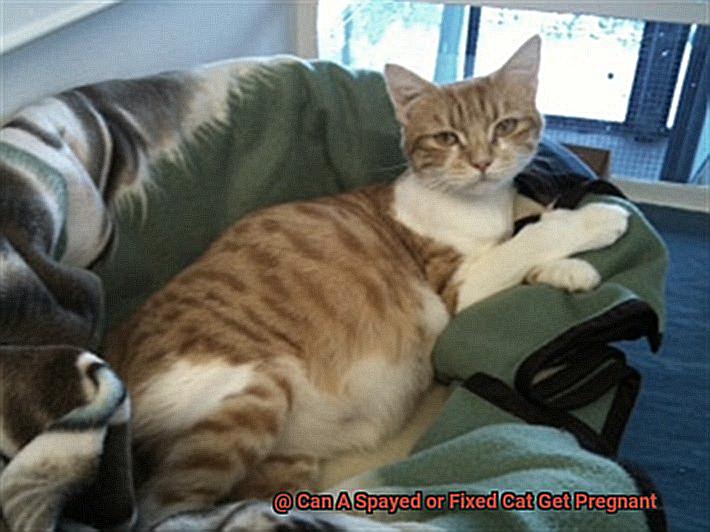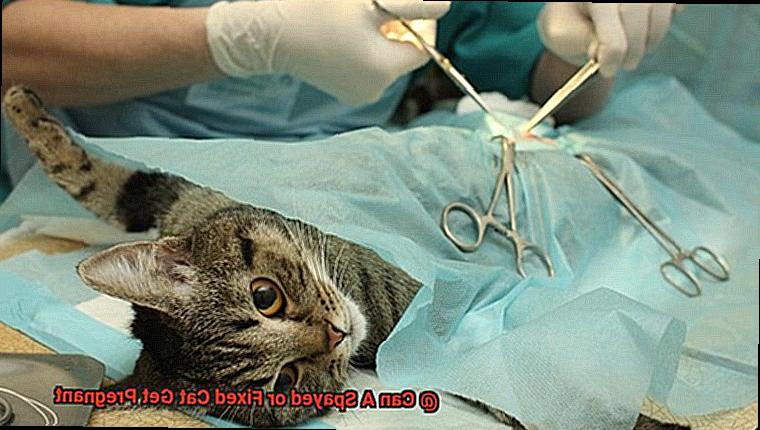Are you wondering if a spayed or neutered cat can become pregnant? It’s a common question asked by many cat owners, especially those considering the procedure. The answer is no – a spayed or fixed cat cannot get pregnant. But there’s much more to know about this important surgery and its risks.
In this blog post, I’ll discuss why it’s so important to spay or neuter your cat and how it prevents pregnancy. I’ll also share the risks associated with the surgery and how you can ensure your pet remains healthy during and after the procedure. Finally, I’ll provide details on what to expect from your cat following the surgery.
So, if you’re considering spaying or neutering your beloved feline friend, keep reading. You’ll learn all about the importance of this procedure, as well as its risks and benefits. With this information, you will be able to make an informed decision about whether or not this surgery is right for your cat.
What is Spaying?
Spaying, also known as ovariohysterectomy, is an important surgical procedure that is performed on female cats to remove their reproductive organs. This includes the ovaries and uterus, making it impossible for them to conceive. Spaying is recommended by veterinarians and typically done when a cat is between 4-6 months of age. It’s a permanent form of birth control that has many benefits for both cats and their owners alike.
One of the primary advantages of spaying a cat is that it helps to prevent unwanted litters of kittens. Female cats typically go into heat every three weeks during breeding season, which occurs from early spring to late fall.
During this time, they may exhibit behavioral changes such as yowling, rubbing against objects, and being more affectionate. If an intact female cat is allowed to mate, she may become pregnant and give birth to a litter of kittens. By spaying a cat, the owner can avoid this risk altogether.
In addition to preventing unwanted litters, spaying can also reduce the risk of certain types of cancers such as mammary cancer and uterine infections.
Female cats that are spayed before their first heat cycle have a much lower risk of developing these types of cancers which can be life-threatening if left untreated.
Furthermore, spaying can help with certain behavioral issues such as aggression, urine marking, and roaming since female cats that are spayed tend to be more calm and docile making them easier to handle and care for.
Although there are many benefits associated with spaying your cat, there are some risks involved with the procedure including infection or bleeding at the incision site which is important to note before deciding whether or not you should have your cat spayed in order to determine if it’s right for your situation.
Can A Spayed or Fixed Cat Get Pregnant?
The answer is no. Spaying and neutering cats is an effective way of eliminating unwanted litters and health problems, as it removes their reproductive organs. This makes it impossible for them to reproduce.
However, there are some rare cases in which the spay procedure may fail, allowing the cat to become pregnant even after being spayed.
Additionally, hormonal changes can lead to a false pregnancy in spayed female cats, where they exhibit nesting behavior and lactation despite not being pregnant.
t’s also worth noting that just because a cat has been spayed doesn’t mean they won’t experience heat; some cats may still have signs of heat even after being spayed.
If you suspect your spayed cat may be pregnant or showing signs of heat, please consult your veterinarian immediately.

Failed Spay or Spay Reversal
Failed spay or spay reversal is an uncommon but possible occurrence in cats. This can happen if the veterinarian accidentally leaves some ovarian tissue during the surgery, or if the cat is already pregnant when the procedure is performed.
Spay reversal, on the other hand, is a deliberate attempt to reconnect the reproductive organs in order to allow pregnancy. However, both of these scenarios come with serious health risks for the cat and can result in difficult labor, uterine infections, and even death.
Therefore, it’s important to take preventive steps by spaying or neutering your cat at an early age and making sure that the surgery is done by a qualified veterinarian using proper techniques and equipment.
False Pregnancy in a Spayed Cat
Generally, no – the removal of a female cat’s ovaries and uterus renders her unable to conceive. Nonetheless, there are rare cases in which a spay surgery is ineffective, leaving the cat fertile and possibly pregnant.
False pregnancy is another potential issue in which a spayed cat may experience symptoms of pregnancy without actually being pregnant. This is caused by hormone imbalances resulting from the removal of reproductive organs during the spay surgery.

Signs of false pregnancy in spayed cats typically appear within weeks or months after the procedure, including weight gain, lactation, nesting behavior, maternal attitudes towards toys or stuffed animals, and an enlarged abdomen. In extreme cases, the cat may develop a life-threatening uterine infection called pyometra.
Treatment for false pregnancy in spayed cats may involve hormone therapy to regulate the hormonal imbalance, draining excess milk, and careful monitoring for complications such as pyometra.

Behaviors of Being in Heat in a Spayed Cat
Though it can be confusing, it’s actually quite normal.
When cats are in heat, they experience a surge of hormones which can cause behaviors such as increased vocalization, restlessness, and a desire to mate. Rolling on the ground and raising their hindquarters are also common signs that your cat is ready to mate.
Although spaying removes the ovaries which produce the hormones responsible for this behavior, some cats may still exhibit mild signs of being in heat. This is especially true if the spay procedure was done after the cat had reached sexual maturity. Fortunately, these behaviors are usually much less intense than what would be seen in an intact cat.
It’s important to remember that if your spayed cat is exhibiting extreme behaviors of being in heat, such as excessive vocalization or aggression, they may be experiencing a medical issue unrelated to their spay procedure.

If this is the case, you should consult with a veterinarian to rule out any underlying health issues.
To sum up, while it’s possible for a spayed cat to display mild behaviors of being in heat, these are typically not a cause for concern.
Signs and Symptoms of Possible Pregnancy in a Spayed Cat
Although it is highly unlikely, there are certain signs and symptoms that may suggest something is amiss.
If you notice your fixed cat gaining weight or her mammary glands enlarging, this could be a sign of a false pregnancy. Furthermore, if your pet is displaying typical heat cycle behaviors such as vocalization, restlessness, and rubbing against objects, it could indicate a failed spay or incomplete removal of reproductive tissue during surgery.
It’s important to remember that these symptoms can also indicate other serious health issues such as tumors or cancer. Therefore, if you detect any unusual behavior in your spayed cat, it’s best to consult with your veterinarian right away.
-y_kPapMjIs” >
Prevention and Treatment for Possible Pregnancy in a Spayed Cat
It may come as a surprise, but a spayed cat can still experience certain pregnancy-like symptoms, such as nursing behavior, swollen nipples, and even weight gain. This condition is known as a false pregnancy, and while it is relatively rare, it is important to be aware of the signs in case it does occur.
If you think your spayed cat is having a false pregnancy, the best course of action is to take her to the vet for an examination. Your veterinarian can provide recommendations on how to manage the symptoms and ensure your cat’s comfort.
In terms of preventing a pregnancy in a spayed cat, there are some things you should keep in mind. First and foremost, make sure your cat has been spayed before assuming she is unable to become pregnant. It is very unlikely, but there have been cases of a failed spaying or a cat becoming pregnant before being spayed.
It’s also important to keep your spayed cat away from intact male cats or those who have not been neutered. While a spayed cat cannot become pregnant, she can still attract their attention and potentially engage in mating behaviors.
If you suspect that your spayed cat may have become pregnant before being spayed, it is essential to consult with your veterinarian immediately. Spaying a pregnant cat can be more complicated than usual and should only be done by an experienced vet. Your vet can also discuss any potential risks or complications associated with the procedure.
Overall, while it is unlikely for a spayed cat to become pregnant, it is important to be aware of the signs of a false pregnancy and take steps to prevent accidental mating with intact males.
Also Read: Can A Cat Get Pregnant When Not In Heat? – 21Cats.org
Conclusion
To sum up, spaying or neutering your cat is a smart and cost-effective choice. Not only does it prevent unwanted litters of kittens, but it also reduces the risk of certain types of cancers and helps with behavioral issues. Plus, it guarantees that your cat won’t get pregnant – ever.
However, there are risks associated with the procedure. These can include infection at the incision site or failed surgeries. Additionally, spayed cats may still exhibit signs of heat and even have false pregnancies due to hormone imbalances.
So if you’re thinking about spaying or neutering your cat, make sure to do your research and talk to your vet first.







